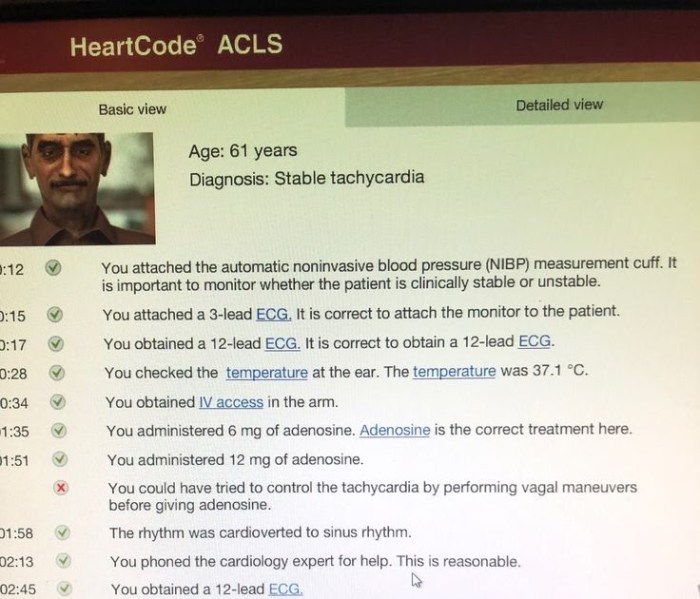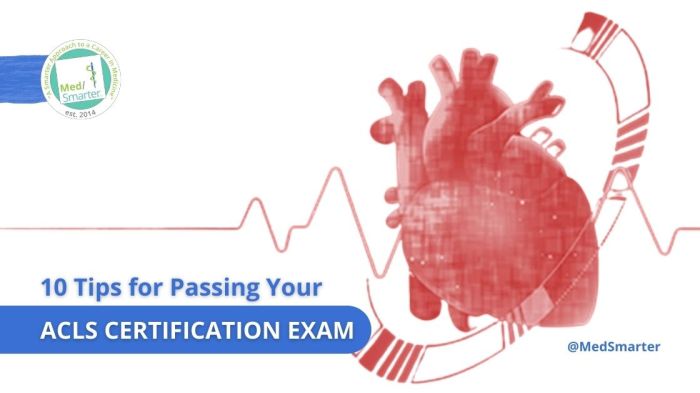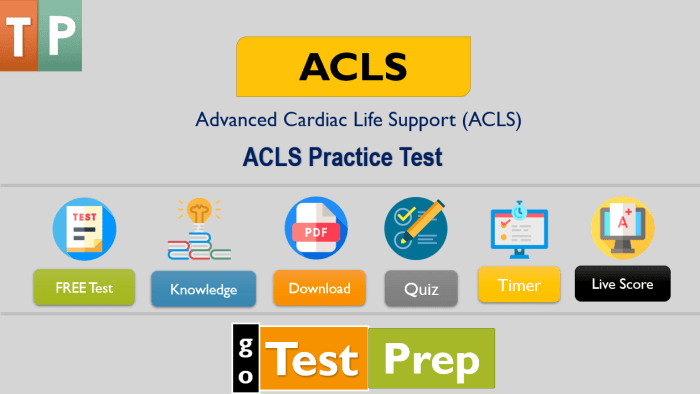Acls exam version a answers – Prepare to excel in your ACLS Exam Version A with our comprehensive guide to the answers. This resource will equip you with a deep understanding of the exam’s structure, content, and key strategies to achieve success. Embark on a journey of knowledge and confidence as we delve into the intricacies of the ACLS Exam Version A.
Our guide provides an in-depth analysis of the exam’s content, highlighting the critical topics you need to master. We present sample questions and detailed explanations, ensuring you grasp the concepts thoroughly. Additionally, we offer proven study strategies, recommended resources, and practical tips to optimize your preparation.
ACLS Exam Version A Overview
The ACLS Exam Version A is a certification exam designed to assess the knowledge and skills of healthcare professionals in providing advanced cardiovascular life support (ACLS).
The exam consists of a written test with 50 multiple-choice questions and 12 case-based scenarios. The written test covers topics such as cardiac arrest management, arrhythmia recognition and treatment, and pharmacology. The case-based scenarios assess the candidate’s ability to apply their knowledge and skills in real-world situations.
Feeling confident after acing the ACLS exam version A? Did you know that a penny weighs a hefty 2.50 grams? Check it out ! Now, back to your ACLS triumph – keep up the great work!
Exam Structure
- Written Test: 50 multiple-choice questions, 12 case-based scenarios
- Time Limit: 2 hours
- Passing Score: 84%
Exam Content
- Cardiac Arrest Management
- Arrhythmia Recognition and Treatment
- Pharmacology
- Airway Management
- Ventilation
Exam Content Analysis

The ACLS Exam Version A assesses a wide range of knowledge and skills essential for managing life-threatening emergencies.
The exam covers five key topics, each focusing on specific aspects of resuscitation and emergency care:
Assessment
- Initial patient assessment and recognition of life-threatening conditions
- Evaluation of vital signs, including heart rate, rhythm, and blood pressure
- Identification of signs and symptoms of cardiac arrest, stroke, and other emergencies
Airway
- Principles of airway management, including airway anatomy and physiology
- Techniques for establishing and maintaining a patent airway, such as head tilt-chin lift, jaw thrust, and suctioning
- Use of adjuncts like bag-valve-mask, nasal cannula, and supraglottic airway devices
Breathing
- Assessment and management of breathing difficulties, including chest compressions and rescue breaths
- Principles of oxygen therapy and administration
- Identification and treatment of common respiratory emergencies, such as asthma, COPD, and pneumonia
Circulation
- Principles of hemodynamics and cardiac physiology
- Recognition and management of cardiac arrhythmias
- Techniques for defibrillation and cardioversion
- Use of vasopressors and antiarrhythmic medications
Drugs
- Pharmacology of commonly used emergency medications, including antiarrhythmics, vasopressors, and analgesics
- Dosage calculations and administration techniques
- Management of medication-related emergencies, such as overdoses and allergic reactions
Sample Questions and Answers

To effectively prepare for the ACLS exam, it is essential to practice with sample questions. The following table provides a selection of sample questions along with their correct answers, explanations, and references to relevant guidelines.
Each question is designed to assess your understanding of a specific aspect of ACLS protocol. By reviewing these questions and thoroughly understanding the explanations, you can identify areas where you need further study and enhance your overall exam preparation.
Sample Questions
| Question | Correct Answer | Explanation | Reference |
|---|---|---|---|
| When performing CPR on an adult, what is the recommended compression-to-ventilation ratio? | 30:2 | The 2020 AHA Guidelines for CPR and ECC recommend a compression-to-ventilation ratio of 30:2 for adults. | 2020 AHA Guidelines for CPR and ECC |
| Which of the following medications is used to treat ventricular fibrillation (VF)? | Amiodarone | Amiodarone is an antiarrhythmic medication that is commonly used to treat ventricular fibrillation (VF). | Amiodarone for the Treatment of Ventricular Fibrillation |
| What is the recommended dose of epinephrine for adults in cardiac arrest? | 1 mg every 3-5 minutes | The 2020 AHA Guidelines for CPR and ECC recommend a dose of 1 mg of epinephrine every 3-5 minutes for adults in cardiac arrest. | 2020 AHA Guidelines for CPR and ECC |
| When should an automated external defibrillator (AED) be used? | When a person is unresponsive and not breathing normally | An AED should be used when a person is unresponsive and not breathing normally, as this may indicate the presence of a shockable rhythm. | Automated External Defibrillator (AED) |
| What is the difference between asystole and pulseless electrical activity (PEA)? | Asystole has no electrical activity, while PEA has organized electrical activity without a pulse | Asystole is characterized by the absence of any electrical activity on the ECG, while PEA is characterized by organized electrical activity without a palpable pulse. | Asystole and Pulseless Electrical Activity |
Study Strategies and Tips
Preparing for the ACLS Exam Version A requires a strategic approach. By incorporating effective study techniques, you can enhance your knowledge and confidence. Here are some strategies to consider:
- Understand the Exam Blueprint:Familiarize yourself with the ACLS Exam Version A blueprint to identify the specific topics and objectives covered. This will help you focus your study efforts on the most important areas.
- Utilize High-Quality Study Materials:Invest in reputable textbooks, online courses, and study guides specifically designed for the ACLS Exam Version A. These resources provide comprehensive content and practice questions.
- Active Learning:Engage in active learning techniques such as flashcards, spaced repetition, and practice tests. These methods help improve retention and recall.
- Join Study Groups:Collaborate with peers in study groups to share knowledge, discuss concepts, and support each other’s progress.
- Practice Regularly:Take practice exams and simulate real-world scenarios to assess your understanding and identify areas for improvement.
Recommended Resources
* American Heart Association’s ACLS Provider Manual
- ACLS Exam Review Course by the American Red Cross
- ACLS Study Guide by Kaplan Medical
- ACLS Pocket Reference by Jones & Bartlett Learning
- ACLS Online Practice Tests by ParamedicCoach
Practice Techniques
* Spaced Repetition:Review material at increasing intervals to strengthen memory.
Active Recall
Attempt to retrieve information from memory without referring to notes or resources.
Simulation Drills
Practice scenarios that mimic real-life ACLS situations to enhance practical skills and decision-making abilities.
Gamification
Incorporate elements of competition or rewards into your study to make learning more engaging.
Exam Day Preparation: Acls Exam Version A Answers

Preparing for the exam day is crucial to ensure a successful outcome. Follow these tips to enhance your readiness and manage stress effectively.
Logistics and Timing, Acls exam version a answers
- Arrive at the testing center well ahead of time to avoid last-minute rush and anxiety.
- Familiarize yourself with the exam format, time allocation, and instructions to manage your time wisely.
- Bring all necessary materials, including your identification card, pens, and a calculator (if permitted).
Mindset
Maintain a positive mindset by focusing on your preparation and abilities. Visualize yourself performing well and trust in your knowledge.
Managing Stress and Anxiety
- Practice relaxation techniques such as deep breathing exercises or meditation to calm your nerves before the exam.
- Avoid caffeine and energy drinks, as they can exacerbate anxiety.
- Stay hydrated by drinking plenty of water to maintain focus and concentration.
FAQs
What is the purpose of the ACLS Exam Version A?
The ACLS Exam Version A assesses your knowledge and skills in managing cardiovascular emergencies.
What are the key topics covered in the ACLS Exam Version A?
The exam covers topics such as airway management, arrhythmia recognition and treatment, and medication administration.
How can I prepare effectively for the ACLS Exam Version A?
Utilize our study guide, practice sample questions, and engage in hands-on training to enhance your preparation.